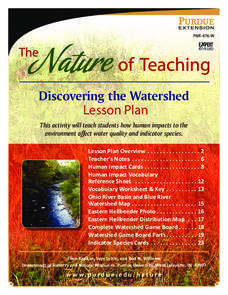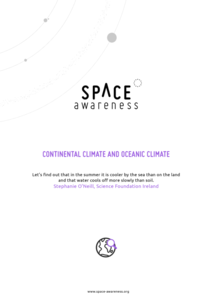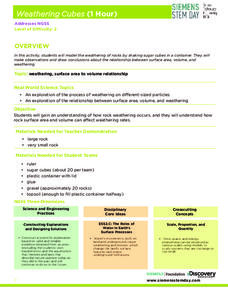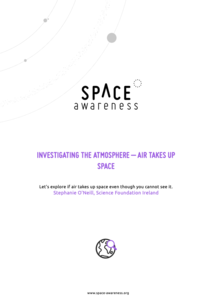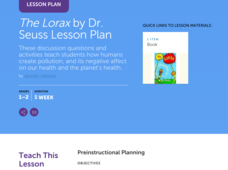Purdue University
The Great Clearcut Controversy
Urban development and habitat retention are often at odds. A three-part lesson examines the pros and cons of forest clearcutting. Learners review data and characteristics of a specific mammal to make conclusions about the effect...
Purdue University
Common Indiana Mammals
Mammals all have their own story to tell. A set of 34 cards outlines the key characteristics of different mammals. The cards include images of each mammal as well as their skulls and tracks. The back of the cards describe characteristics...
Purdue University
Coloration Exploration
Finding an animal in nature can be like a game of hide and seek. A thorough lesson explores different coloration strategies of animals. Pupils complete look-and-find puzzles and coloring sheets to differentiate between different types of...
Purdue University
Discovering the Watershed
Human impact on watersheds can make or break an ecosystem. Learners use a game to learn about the impact human choices have on water quality and the organisms that depend on it. The activity includes a game board and game cards that tell...
Purdue University
Healthy Water, Happy Home
Clear water does not mean clean water. A collaborative lesson has groups play a board game to identify sources of water pollution and develop strategies for improving water quality. Their investigations include reference to the water...
Purdue University
Mammal Food Webs
You are what you eat—or at least a part of what you eat. Budding scientists examine owl pellets to develop their own food webs. They use tooth and skull identification techniques to classify what they find.
Purdue University
Animal Diversity and Tracking
What exactly are those glowing eyes in the night? Learners run an experiment to attract local wildlife and then document the number of visitors by identifying their tracks. They then analyze the data to draw conclusions about the types...
Purdue University
Let’s Go Outside
Nature is good for the soul. The final activity in the fine-part Family Nature Program series discusses the benefits of having an active connection with nature. Learners complete an imagery activity that relates nature to a calming...
Space Awareness
Continental Climate and Oceanic Climate
There's nothing better than a cool breeze blowing in from the ocean. Scholars explore how water affects change in temperature using a hands-on experiment on climate. They use measurement tools to compare the continental and oceanic...
Discovery Education
Weathering Cubes
Weathering is not necessarily a result of the weather. Scholars conduct an experiment to explore the effect of surface area and volume on the weathering process. They create their own sugar cube rocks using the same number of cubes—but...
Space Awareness
Investigating the Atmosphere - Air Takes Up Space
How do you know there is air? Can you see it, smell it, feel it? To begin the investigation, learners watch a video and discuss what they know about air and the atmosphere. Then, they participate in five different hands-on, inquiry-based...
Water
Global Water Supply Elementary School Curriculum
Water is the focus of an interdisciplinary unit that brings awareness to its daily use around the world and the importance of conservation. Worksheets challenge scholars to match words and definitions, trace, complete a maze, and solve a...
Population Connection
Lessons From the Lorax
Is progress progressing too fast? So believes the Lorax, the eponymous character from Dr. Seuss's The Lorax. Young environmental science students read the book and debate the arguments of the Lorax and the Once-ler regarding the value of...
PBS
The Lorax
Accompany a reading of Dr. Seuss' tale, The Lorax, with a five-item worksheet. Questions challenge scholars to list characters' names, use text details to answer inquiries, and describe the moral of the story.
Creative Learning Exchange
Lesson Plans From The Lorax
When it comes to the environment, no variable is constant. Class members graph behavior over time for the thneeds produced over truffula trees chopped down over the course of Dr. Seuss's The Lorax.
WakeGOV
Plastic Sight Words
Plastic math? Have young learners count and name the number of plastic items in their centers. Kindergartners match sight word cards to the number of plastics in a given group, while learning that plastics come in all different shapes,...
Newspaper Association of America
Community Connections with Geography and the Newspaper
Understanding geography and government begins at the local level. Using maps and the parts of a newspaper, a unit plan introduces the concept of community. It starts with the creation of classroom and school maps, and then moves through...
Super Teacher Worksheets
Make an Earth Day Mascot
Scholars follow three steps—color, cut, and fasten—to create a mascot for Earth Day. The holiday's mascot is a jolly planet Earth equipped with a big smile, excited eyes, and dancing arms and legs.
Advocates for Human Rights
The Right to a Clean Environment: Water
First, young citizens learn about water consumption by doing some research themselves on their home water usage and sharing their findings with the class. Then, they do some brainstorming and devise a plan to reduce water consumption.
Science Education Resource Center
Compare and Contrast deciduous and evergreen tree leaves to aid in tree identification
Boost observational skills and get to know the difference between deciduous, coniferous, and evergreen trees with a lesson that challenges scholars to compare, contrast, identify, sort, and draw their findings.
Curriculum Corner
Earth Day Book
This Earth Day, celebrate our beautiful planet with an activity book that challenges scholars to show off their map skills, complete a crossword puzzle, write acrostic poems, alphabetize, and reflect on their personal Earth-friendly habits.
Scholastic
The Lorax by Dr. Seuss Lesson Plan
Celebrate the whimsical world of Dr. Seuss with a lesson that features the memorable tale of The Lorax. After listening to a riveting read-aloud, scholars take part in a grand conversation about the story and environment. Then they...
Seussville
What Can Your Class Do?
Inspire scholars to do their part for planet Earth with a read-aloud of Dr. Seuss's The Lorax, and variety of activities designed to boost the environmental activist in us all. Activities include writing poems about the Earth, sorting...
Seussville
The Lorax's Earth Day
Add a touch of Dr. Seuss whimsy to your Earth Day celebration with six pages consisting of Earth-friendly, inspiring, and engaging activities designed to enhance the beauty of your school campus and showcase the famous story, The Lorax.





